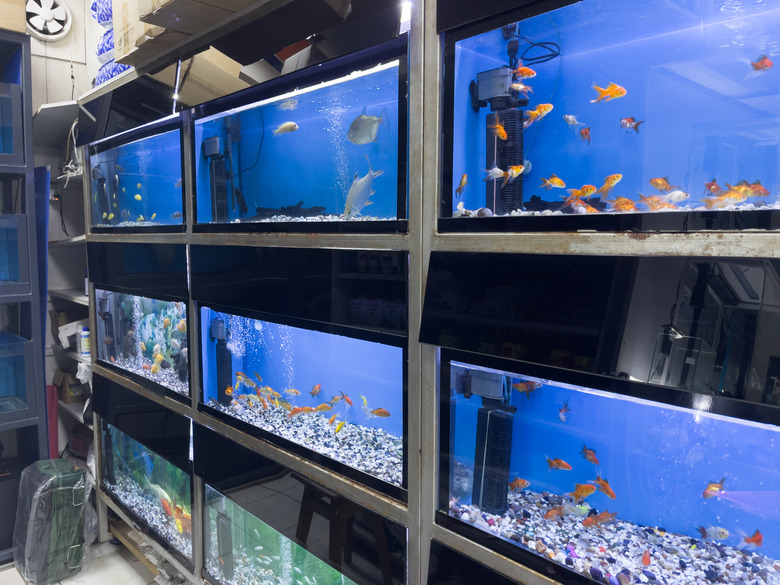Is It Ethical To Buy A Pet From A Pet Store?
It may be tempting to bring home a puppy or kitten from a pet shop. However, there are many ethical issues with buying a dog, cat, or other pet from a pet store. It's important to know how pet stores operate in order to understand why they should be avoided.
Where do pet stores get their animals?
Where do pet stores get their animals?
Animals sold at chain pet stores are purchased from third-party suppliers who may not be local. The animals must endure the stress of being shipped long distances in small containers without food or water.
Pet store employees may not be allowed to disclose any information about their suppliers. On the other hand, they may also use specific verbiage claiming the supplier is a small local breeder, a family farm, or USDA-licensed. None of these suppliers guarantees that the animals are well cared for.
Animal welfare in pet stores
In 2019, a routine inspection of Petco stores in Colorado revealed over 80 animal care violations at 12 stores. Violations included excessive amounts of dead fish in tanks, temperatures 20 degrees too low for reptiles, a lack of veterinary care leading to the death of animals, and more. There were 7 out of 12 stores with violations that could not prove they had current agreements with a veterinarian.
Sadly, the 2019 Colorado report is only one of the hundreds detailing animal cruelty at Petco and other chain pet stores in other states.
Puppy mills and puppy farms
Puppy mills and puppy farms
Companies that supply puppies to pet stores are some of the worst offenders when it comes to animal welfare. According to research by the Humane Society of the United States, there are over 10,000 puppy mills or puppy farms in the United States alone. Less than 3,000 of these operations are regulated by the U.S. Department of Agriculture.
A puppy mill's only goal is to produce and sell as many puppies as possible as fast as possible while reducing overhead and maximizing profits. In order to do so, puppy mills disregard dogs' physical and mental well-being. Puppy mill dogs are not given proper diets, veterinary care, enrichment, exercise, or socialization.
The terrible conditions at puppy mills result in puppies with illnesses, genetic defects, and psychological issues. A 2017 report from the Humane Society showed over 5,100 complaints filed over a 10-year period which describe puppies suffering from serious illnesses or dying suddenly.
These 5,100 complaints represent only a fraction of actual cases. The Humane Society noted that the report was compiled from complaints submitted through their online form, while other buyers may report complaints directly to the seller, to local animal control or law enforcement, or not at all.
Are these practices legal?
Are these practices legal?
While there are no federal regulations concerning pet store animal sales, over 300 cities and counties have passed retail pet sale bans. Some bans apply only to the sale of puppies or kittens; others include rabbits and chinchillas.
In 2020, California passed a state law banning pet stores from selling puppies or kittens. Any pet store which violates the law will be fined thousands of dollars and can also be shut down.
Pet store alternatives
Adopt, don't shop
With over six million dogs and cats entering U.S. animal shelters every year, adopting a pet is an ethical alternative to buying from a pet store. Animals in the shelter system range from kittens to seniors, purebred pups to super-mutts, and everything in between. Many animal kennels and rescue groups also have small mammals, birds, and reptiles for adoption.
Adoption is cheaper than buying from a breeder, and by taking home a shelter pet you are helping to make room for other pets in need. PetFinder is a great resource for finding adoptable pets.
Local pet supply stores
If you're looking for a reptile, fish, or small mammal, a local pet store can be a good option. Ask where their animals come from and how animals are cared for at the store. Spend some time observing their animals and ask to handle them to get a good idea of their overall health and enclosure conditions.
Responsible and ethical breeders
If you want a dog for a specific purpose (such as agility, hunting, or guarding livestock) you may need to look for a breeder. Responsible, ethical breeders ensure good genetics, healthy animals, and an obvious paper trail (licenses, affiliations, etc).
Thorough research is vital to finding good breeders that sell pets. The American Kennel Club provides a helpful guide for finding and working with the right breeder. The Humane Society also has a handy guide and checklist for finding responsible dog breeders.
Here are some tips for what to look for in selecting a responsible breeder:
What to look for in a responsible breeder:
1. The breeder always meets a prospective owner in person. The meetings are never at a pet store or over the internet. They will also suggest more than one visit and inquire about your home and family. You should be able to schedule a visit and have a tour of the grounds.
2. All of the animals appear to be happy, healthy, and clean. They have enough room to safely roam, have ample physical and mental enrichment, and enjoy basic socialization. There should also either be one or a few types of pets (in particular dogs and cats). A breeder will also have you meet your pet's parents — at least their mother.
3. The breeder will keep in touch after you purchase a pet from them. They will offer you advice on how to care for and train your new pet. The breeder may also provide you with contact information
4. You will have copies of all of the potential pet's health records from a veterinarian. The breeder will also give you the health records of your new pet's parents for their healthcare plan. They should be knowledgeable about any genetic or developmental conditions pertaining to a specific pet or breed.
5. You will sign a contract with your breeder. The document should state that in the event you cannot keep your new pet, they will be returned to the breeder.
The bottom line
The bottom line
You should purchase pet supplies from a pet shop — not animals. Many pet stores use unethical business practices that directly harm animals. Pet stores often source their animals from corporate suppliers or puppy mills — these are notorious for their inhumane treatment of animals. They also violate animal welfare standards. Therefore, adopting a pet or buying from a responsible breeder are ethical alternatives to purchasing animals from pet stores.
References
- Petco: Code of Business Conduct and Ethics
- Humane Society: Puppy Mill Research
- Humane Society: Puppy Buyer Complaints – A Ten Year Summary 2007-2017
- PetFinder: Where Do Pet Store Puppies and Kittens Come From?
- Humane Society: Investigations and Reports
- Humane Society: Puppy Mill Doublespeak
- American Society for the Prevention of Cruelty to Animals: Beware of 'Puppy Leasing'
- Daily Paws: New California Law Bans Sales of Dogs, Cats in Pet Stores
- Best Friends Animal Society: States With Retail Pet Sale Bans
- American Society for the Prevention of Cruelty to Animals: Retail Pet Sale Bans – Standing Against Puppy Mill Cruelty
- American Society for the Prevention of Cruelty to Animals: Pet Statistics | Shelter Intake and Surrender
- American Kennel Club: 7 Tips for Finding and Working With a Responsible Breeder
- Humane Society of the United States: How to Find a Responsible Dog Breeder
- Denver Post: Colorado Regulators Find Dozens of Violations at Local Petco Stores
- Humane Society of the United States: Pet Store Doublespeak
- Petfinder: Find your new best friend



